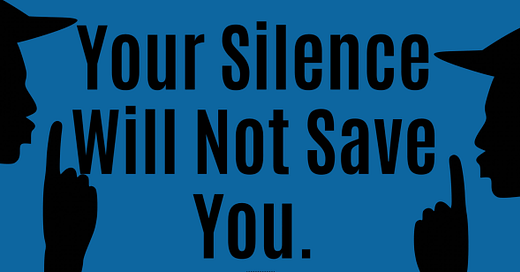You Can Remain Silent in This Moment, But I Don’t Recommend It: A Call to Activism
“The job of a citizen is to keep one’s mouth open.” Günter Grass
In times of political and social upheaval, the temptation to remain silent can feel overwhelming—especially when despair, powerlessness, and fear take hold. Yet for marginalized communities, these crises are not new; they are an enduring reality. When legitimate concern gives way to anxiety, and anxiety spirals into paralysis, inaction becomes its own form of complicity. As Audre Lorde famously warned, “Your silence will not protect you.” Silence in the face of injustice is not neutrality; it is surrender. To say nothing is to side with oppression. While millions of people last week took to the streets in protest of the current administration and it’s policies, the question that remains is: was last weekend the start of a movement, or simply a “moment”?
We now stand at a precipice where democracy itself is under threat. Activism is no longer optional—it is a moral obligation. As Günter Grass declared, “The job of a citizen is to keep one’s mouth open.” Our task is clear: to resist, to organize, and to demand change—even from the position of a political minority.
The Temptation to Despair
Authoritarianism, systemic inequality, and environmental collapse can make disengagement seem pragmatic. Survival, after all, is a powerful instinct. But Lorde’s warning rings truer than ever: Silence is not refuge—it is surrender. When we retreat, we cede ground to those who would dismantle democracy, suppress dissent, and further marginalize the vulnerable. Despair is a natural response, but it must not become a permanent state. Instead, it should serve as a signal—a diagnosis of societal illness. As a physician, my role is not just to identify symptoms but to treat their root causes. The same applies to politics. Our collective malaise demands action, not resignation.
The Responsibility to Participate
Gräss was right: “The duty of a citizen is to keep his mouth open.” Democracy is not a spectator sport; it thrives on participation. Our most basic political voice is the ballot—but voting is not the only tool we have. When we vote, we shape the future; when we abstain, we consent to the status quo. For those in the minority, speaking out is even more critical. It challenges dominant narratives and creates space for justice.
Activism takes many forms: voting, protesting, organizing, educating. The fight cannot be limited to “winnable” battles. Justice requires us to wage the fights worth fighting—even when victory seems distant. Authoritarianism is not defeated in a single moment but through relentless, collective resistance. What is needed right now is a movement, not a “moment” of outrage. Every voice raised chips away at injustice’s foundation.
Action Plans: Personal and Political
In crisis, the question is not “How did we get here?”, but “What are we going to do?”—a refrain echoed by the elders of my Southern Black community. Identifying problems is not enough; we need solutions. The path forward requires activism on both personal and political levels.
Personal Action
Activism begins with self-education and self-care. To combat oppression, we must first understand it. This means:
- Reading widely and centering marginalized voices.
- Critically analyzing media, from CNN to Fox News.
-Protecting our mental health to avoid burnout. (I, for one, have had to step back from the 24-hour news cycle.)
It also means using our platforms—however small—to speak out. Have hard conversations. Share resources. Write to elected officials. And as Rabbi Abraham Joshua Heschel reminded us: *“Some are guilty, but all are responsible.”
Political Action
Change requires collective effort. For the marginalized, this means:
- Building coalitions to amplify impact.
- Engaging in local politics—school boards, city councils—where grassroots change begins.
- Leveraging democratic tools: lobbying, supporting progressive candidates, and holding leaders accountable.
- Embracing direct action: protests, strikes, civil disobedience.
History offers inspiration. Consider Henry David Thoreau, jailed for refusing to pay taxes to a government upholding slavery and waging war on Mexico. When Ralph Waldo Emerson visited him and asked why he was in jail, Thoreau turned the question back: “Why are you not here with me?”
In this moment, silence may feel safe, but it is a betrayal of our duty as citizens. As Lorde insisted, silence protects no one—it only empowers oppressors. Our responsibility is to speak, to resist, and to act. For those of us in the political minority, but who will not rest until human the right to practice justice and democracy are restored, the task is daunting but not impossible. Despair must fuel action, not apathy. Frederick Douglass’ words remain urgent:
“Power concedes nothing without a demand. It never did and it never will... The limits of tyrants are prescribed by the endurance of those whom they oppress.”
This struggle—moral, physical, or both—demands our voices and our courage. Activism is not optional. It is urgent and necessary.



